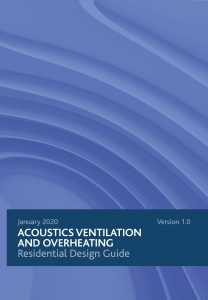After almost two years of research, ANC, the Association of Noise Consultants, is launching its Acoustics Ventilation and Overheating (AVO) Residential Design Guide.
Produced by the ANC’s AVO Group, the guide provides a resource for practitioners and designers to balance the interdependence of noise, ventilation, and overheating in the acoustic assessment of new residential developments.
Intended for the consideration of new residential developments that will be exposed predominantly to airborne sound from transport sources, and to sound from mechanical services that are serving the dwellings in question, ANC sought cross-industry consultation to obtain input from a range of sectors for the project, including building services and environmental health.
The official launch of the AVO guide takes place on Thursday, January 30th, at 15 Hatfields, South Bank, London.
Dan Saunders, Chairman of the ANC said: “We’ve received a considerable amount of support and interest from organisations including the IOA, CIBSE and CIEH, who recognise the need for more guidance and closer collaboration in this area of work.
“The issue of noise, ventilation and overheating is a pressing one, particularly in light of the changing climate patterns and drive towards more energy-efficient homes, and the AVO guide will provide a useful reference point in an issue of growing significance.”
A range of information to help avoid potential pitfalls is featured in the guide, including health and wellbeing risks for occupants, design risks for consultants and legal risks for developers.
It also includes an explanation of ventilation requirements under the building regulations and in Approved Document F, along with typical ventilation strategies and associated noise considerations, as well as an explanation of the overheating assessment methodology described by CIBSE TM59.
As supplementary guidance to the well-established Professional Planning Practice Guidance (ProPG): New Residential Development, the Acoustics Ventilation and Overheating (AVO) Residential Design Guide provides a consistent and complementary approach to the acoustic assessment.
It recognises that there is not a ‘one-size fits all’ style assessment and sets out the potential range of acoustic criteria and guidance relating to different ventilation and overheating conditions for both environmental noise ingress and building services noise – and concludes with a worked example of the application of the AVO Guide, including indicative design solutions.
Dan added: “The AVO guide takes an integrated view of residential conditions for noise, ventilation and thermal comfort, suggesting tolerances over the conventional singular criteria for noise regardless of ventilation condition or provisions for overheating.
“The adaptive thermal comfort model illustrates the importance of control over one’s environment in avoiding annoyance or achieving satisfaction and the document takes the concept of control and integrates it to enable a much more nuanced assessment of internal noise conditions.
“This is vital to the design of sustainable, resilient dwellings that are adaptable to future scenarios.”
The guide can be viewed at https://www.association-of-noise-consultants.co.uk/avo-guide/

